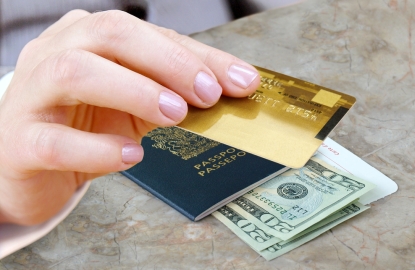Best Credit Cards for International Travel

Overseas travel is once again on the rise: Nearly 59 million Americans booked international trips last year, up 3 percent from 2010. Unfortunately, once travelers touch down on foreign soil, they're finding that the U.S. dollar isn’t buying what it once did, making it more important than ever before to minimize exchange rates and transaction fees. The credit card you bring along with you can make a big difference, so while you're renewing your passport, make sure you’ve got the right credit card to go with it. Here are a few things to consider when picking the best credit card for international travels.
Does Your Credit Card Charge Foreign Transaction Fees?
It’s not unusual for a credit card to tack on a 3 percent fee onto any charges made overseas. Chase Freedom charges 2.7 percent for overseas purchases, for example, and some American Express cards charge 3 percent—that’s an extra $90 for every $3,000 you charge.
Unfortunately, most people either overlook or are unaware of this fee. In fact, according to a recent survey by Capital One, nearly half of all rewards card holders weren’t sure whether or not they were charged foreign transaction fees.
Cap One cards do not charge foreign transaction fees. Neither does Chase Sapphire Preferred, American Express Platinum, or Marriott Rewards and Hyatt Visa Signature cards. Discover cards don’t charge these fees either, but keep in mind that this won’t help if the card itself isn’t acknowledged. (Discover is not widely accepted internationally.)
Will Your Credit Card Be Accepted Abroad?
Low rates and fees won’t do much good if shop owners, hoteliers, and restaurateurs won’t take your card in foreign countries.
I’ve never had problems using a Visa or MasterCard in any part of the world and their exchange rates beat AmEx—not to mention most currency exchange services. (In general, you’re better off using a credit card than exchanging cash over the counter.) Discover cards fall short overseas. And while American Express has a strong presence in specific markets like Asia, you will likely encounter resistance in some places to the 3 percent transaction fee they charge.
There have been reports of credit cards with magnetic strips being turned away in Europe due to concerns about fraud, which is making chip cards with PINs more desirable. As a work-around, Travelex offers a prepaid card that fits the bill for countries where Euros and British pounds are accepted, and is reloadable online using a Visa or MasterCard. It charges no foreign exchange fees and offers an exchange rate similar to the one offered by American Express.
Is it Cheaper to Use a Credit Card or to Pay by Cash?
It may prove more cost efficient to get cash at an ATM than at a cash exchange counter, but if you want to avoid fees altogether, you may be better off making a purchase directly with your card than exchanging for cash first. Certain Visa debit cards charge a 3.5 percent fee for ATM withdrawals, for example, but only 1.75 percent for direct purchases.
Does Your Card Entitle You to Additional Overseas Travel Perks?
American Express Platinum is a very nice card for overseas travel, and recently upped its ante. Not only did AmEx Platinum waive its 3 percent foreign transaction fee, it also expanded airport lounge access to over 600 lounges worldwide and added a $100 credit towards Global Entry, a government program that allows travelers returning to the U.S. to bypass that long customs line. Platinum cardholders can also get a refund of up to $200 for baggage fees or in-flight meals, and a free business-class companion ticket each year usable on many international destinations. Is this enough to justify the $450 annual fee? That depends partly on how much you travel.
For a considerably lower annual fee of $95, waived the first year, the Chase Sapphire Preferred card comes with no foreign transaction fees and up to 20 percent off airfare, hotels, and cruises booked through the Chase Ultimate Rewards program. You also get two points per dollar spent on travel, on top of the 40,000 sign-up bonus points earned if you spend $3,000 in the first three months.
Cheaper still is the Capital One Venture card. For a $59 annual fee, waived the first year, you get Visa Signature benefits such as concierge service wherever you travel, lost-luggage reimbursement insurance, and no foreign transaction fees. You also earn two miles per dollar spent, redeemable for any travel expense, including airfare on any airline at any time (with no blackout dates).
In short, to be on the safe side, it’s a good idea to have more than one type of credit card in your wallet when you travel, and to consider tacking on a prepaid card (like those offered by Travelex) that you can reload over the Internet.
Fodors.com contributor Cathleen McCarthy is the rewards expert forCreditCards.com and covers hotel and travel deals in Northeast cities on her own network, Save on Cities. Her stories have appeared in The Washington Post, WSJ, Amtrak ARRIVE, Town & Country, and many in-flight magazines.
Photo Credit: Female hand with credit card via Shutterstock